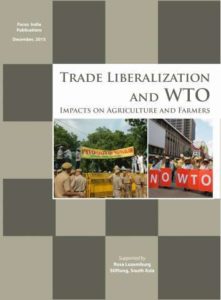
2015 is a significant year in the history of the International Free trade regime, as its key multilateral instrument, the World Trade Organization (WTO), completes 20 years. Two decades of the WTO have raised many questions, most significantly, is the WTO relevant to small and marginal farmers in the Global South? This question remains relevant as developing countries continue to fight for protection and gains for their small and marginal farmers. Special and Deferential Treatment (S&DT) for small farmers under the Agreement on Agriculture (AoA), has so far been firmly denied by developed countries led by the United States (USA). Developing countries have been asked by developed countries to discontinue subsidies for their small farmers despite the fact that they themselves provide huge subsides to their own farmers. The disparity between support provided in the agricultural sector by USA and India is stark. While the USA provides over $57,901 US dollars per farmer (in 2012), India offers only around $99 US dollars for every person active in agriculture.
WTO is an instrument of the processes of globalization, marketization and recolonization which has lead to exploitation and marginalization of the poor. These processes are being pushed by multinational corporations which in their quest for profits constantly seek to expand operations by transforming national laws to favour foreign corporations over local people.

![[IN PHOTOS] In Defense of Human Rights and Dignity Movement (iDEFEND) Mobilization on the fourth State of the Nation Address (SONA) of Ferdinand Marcos, Jr.](https://focusweb.org/wp-content/uploads/2025/07/1-150x150.jpg)



